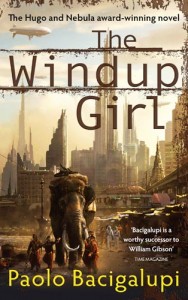Interview with Paolo Bacigalupi – Part 1
 Paolo Bacigalupi is an author that needs no introduction: his debut novel THE WINDUP GIRL won a host of awards, including a Hugo and a Nebula. His second book – a young adult novel called SHIP BREAKER – will be published in paperback in July by Orbit’s sister imprint, Atom.
Paolo Bacigalupi is an author that needs no introduction: his debut novel THE WINDUP GIRL won a host of awards, including a Hugo and a Nebula. His second book – a young adult novel called SHIP BREAKER – will be published in paperback in July by Orbit’s sister imprint, Atom.
Paolo kindly took some time out from his busy schedule to answer a few questions about his writing.
In this first part, Paolo discusses the inspiration behind THE WINDUP GIRL and the concern he feels about a possible future where fossil fuels have run out.
What was the original inspiration for THE WINDUP GIRL? What was the spark that made you think I have to tell this story?
Honestly, it wasn’t just one thing. I originally wrote a short story that was set in Bangkok but it was so hairy and convoluted that it didn’t work. A friend of mine commented that if felt so packed with ideas that is was a bit of a dwarf star, and she suggested that I was actually working on a novel. At the time, I was horrified, because I’d had four novels rejected previously, and was pretty determined to only write short stories, ever after. So I took the most interesting aspect of the world and wrote a different story (one that really was a short story) called “The Calorie Man.” That story utilized some of the ideas about peak oil and agribusiness and GMOs that I was interested in, and that was that. Later, I was looking to write another story, and I’d always found the character of Tan Hock Seng interesting from that original short story, and so I went and wrote a piece of his back story, and that became “Yellow Card Man.”
Around that time, I was getting nominated for a lot of awards, and I think “The Calorie Man” had just won the Theodore Sturgeon Award, and my ego started getting back in the game. I started thinking that maybe if I wrote a new novel, that it might have a chance of selling… so I started working on a novel based in the world of “The Fluted Girl,” another short story of mine. But as I was starting to work on it, I ended up having a conversation with Maureen McHugh about the project, and she gave me this disappointed look and said something along the lines of “I think you’ve probably figured out everything you need to learn from that story.” Which sort of rocked me back. But I ended up thinking about what she was saying, and in some ways, she was right. I didn’t have much new to say about The Fluted Girl, and meanwhile, I still had that big gnarly dwarf star of a novel sitting around, staring at me.
So in end, I think the reason I wrote the Windup Girl was at least partially because it was the most ambitious and difficult thing that I could attempt. And it was complex enough that if Maureen ever asked me what I was working on again, I wouldn’t automatically earn her contempt. Of course, then the book turned out to be even more challenging than I’d originally thought. It had a lot of characters and storylines, it was set in a culture that I needed to learn a lot about, and the mechanics of the world were fanciful enough that I wasn’t sure readers would be able to accept it at novel length. In the end, it took me about three years to write, not including the couple years before where I’d been working out the world and writing short stories set there. So, that’s one part, at least. It helped that it seemed like it was a relevant story, and that it had something relevant to say about agribusiness, and energy and maybe economic colonialism. When I look back on it though, and think about how difficult it was to write it, I have no idea why I finished it. Pure stubbornness? I liked the characters quite a lot. Every flawed one of them. But I do remember that after I finished the book, that I had no faith that it would sell, and I felt embarrassed that I was going to try to inflict it on the world.
Both THE WINDUP GIRL and SHIP BREAKER are set in the near future where fossil fuels have run out – what is it that inspires and excites you about such settings?
I wouldn’t say it excites me; I’d say that it worries me. It feels like we’re on the cusp of a series of major shifts in the way our world works, whether that’s a loss of cheap and easily portable energy or global warming, and that raises a lot of question marks about what our future will really look like. I tend to focus on worst case scenarios — the ones where we just keep using the last of our oil to drive our kids to their football games, instead of using it to build our next generation of energy infrastructure. But it’s not because I like those scenarios or those worlds. Frankly, the settings in my stories depress the hell out of me. But I don’t really see major trend lines pushing us in some other, more positive or sustainable direction, so it feels untruthful to me, if I write about anything other than depleted and broken futures.
Look out for Part 2 of the interview later this week!
